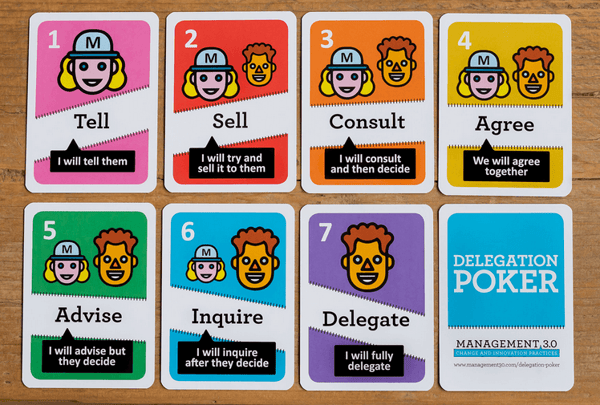Leadership in an agile world (8): delegation poker
How you can make decision-making processes transparent and sustainably promote self-organization
In a dynamic VUCA world it is necessary that decisions are made quickly and above all where competence and expertise lie. In hierarchical systems, decision-makers are usually too far away from the actual situation and thus become the bottleneck of their organisation. "At this point, "Delegation Poker" offers an opportunity to playfully deal with the various stages of the delegation of decisions. In the eighth part of our series you can read how this agile method works in detail and how "Delegation Poker" can help you to ensure more transparency and promote the self-organization of your employees in the long term.
What is Delegation Poker?
The card game by Jurgen Appelo essentially serves to discuss and test one of the most important elements of agile leadership, the delegation of decisions, step by step in a protected room. The team is to be empowered to organise and take responsibility for itself at various levels of delegation.
In specific situations, this involves clarifying who has what responsibilities and powers and then deriving general rules of action from these. In this way "Delegation Poker" creates transparency with regard to the decision-making process and relieves both the management level and the project teams and not least the individual employee. "Delegation Poker" can thus stimulate discourse about the various possibilities of decision-making processes, create clarity about the advantages and disadvantages of the respective delegation levels, and jointly find the best possible form for the manager and the team in a specific situation.
How does Delegation Poker work?
Delegation Poker" basically distinguishes between seven levels of delegation:
The first level corresponds to "announcing", in which the manager merely communicates his decision to the team.
At the second level, the manager makes the decision, but tries to convince the team that the decision is correct.
On the third level, "consulting", the manager is advised by the team before making a decision.
The fourth level, "unifying", aims at a consensus between the team and the manager.
At the fifth level ("consulting"), the decision-making authority shifts in the direction of the team, which is now being advised by the manager.
At the sixth level, the manager asks only for the result of the decision ("Inquire").
At the seventh and final stage, "delegating", the team makes the decision autonomously.

Before the game, each player receives a set of cards numbered 1-7 according to the levels described. Before the game begins, the other players consider relevant scenarios in which a decision has to be made, for example the hiring of new employees or the financial framework of a project. Each player now chooses a delegation level that he considers appropriate. After all players have decided, the cards are revealed. The players with the highest and lowest values justify their decision. The aim of the game is to work out a common consensus. The game continues until a unanimous result is reached. Then the next scenario can be played on.
How to promote transparency and self-organization with Delegation Poker
With "Delegation Poker", managers can set specific impulses, implement new decision-making principles and transfer more authority to their employees. A particularly valuable insight here is that the transfer of responsibility is not structured as a "either I do it or you do it", but manifests itself in various gradations that are situation-dependent.
The design of decision-making processes represents the core aspect of different leadership styles, which depend on the respective context with regard to their effectiveness. Which leadership style is chosen depends, as in "Delegation Poker", on the framework conditions of the various scenarios. The card game can also be used to test different leadership styles among employees.
Above all, "Delegation Poker" creates transparency about the decision-making processes and provides more security by establishing guidelines for action that relieve the management level and the individual employee. Clear action guidelines with regard to decisions permit self-organized work and can give each employee the appropriate freedom. It is important to think of the derived guidelines as dynamic and open to further adjustments.
Conclusion
Delegation Poker is an effective method to create transparency about decision processes in a playful way and to relieve everyone involved in the process. The card game can also provide leadership impulses, promote the self-organization of the team and create security through decision-making structures. However, it should be borne in mind that the game rounds may take time and individual scenarios may have to be worked on in order to derive effective rules of action.
(editorial implementation: Corinna Brucker)
Are you interested in Delegation Poker or would you like to get to know this agile method in detail? Then please feel free to learn more about our services in this area or simply contact us.
Further blog posts from the series "Leadership in an agile world":
Leading in an agile world (1): the concept of agility
Leadership in an agile world (2): "working out loud"
Leadership in an agile world (3): scrum
Leadership in an agile world (4): barcamps
Leadership in an agile world (5): retrospectives
Leadership in an agile world (6): peer feedback
Leadership in an agile world (7): transparency
Leadership in an agile world (8): Delegation Poker
Leadership in an agile world (9): crossfunctional teams
Leadership in an agile world (10): face time
Literature
Kallenbach, Ingo (2016): Leadership in a healthy organisation. Extraordinary performance by means of potential development. Stuttgart: Schäffer-Poeschel

